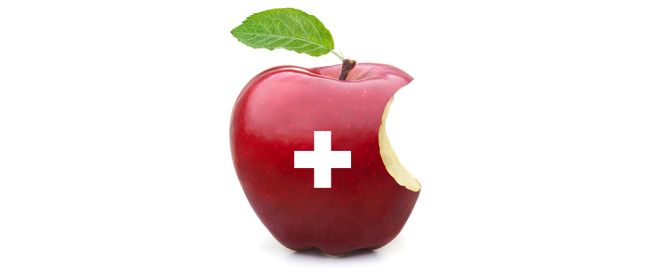- within Employment and HR, International Law and Insurance topic(s)
- with Inhouse Counsel
- with readers working within the Banking & Credit, Media & Information and Law Firm industries

Apple Inc. ("Apple") is taking on apples everywhere in a truly bizarre trademark battle. Apple has now initiated proceedings in order to secure proprietary rights to the image of apples, the fruit, in Switzerland. Arguably, Apple has now become synonymous with phones, laptops, and with the image of an apple with a bite taken out.

While Apple owns the trademark rights for that logo, granting it the exclusive right to use that image in any form or manner, the move to secure its trademark rights to pictures of apples everywhere is unprecedented, to say the least. Through a trademark application in Switzerland, it is attempting to procure and secure rights over a photographic, true-to-life depiction of Granny Smith apples, an variety of the generic green apple.
Apple's attempts to secure the trademark of the depiction of an apple go as far back as 2007, when it filed an application under the Madrid Protocol designating multiple countries including Australia, Singapore, China, United Kingdom and Switzerland, amongst a few, requesting the IP rights for a realistic, black-and-white depiction of an apple.

The request covered an extensive list of potential uses—mostly on electronic, digital, and audio-visual consumer goods and hardware in Class 09 of the Nice Classification. In Switzerland, following a protracted back-and-forth between both parties, the Switzerland IP office partially granted Apple's request, stating that Apple could have rights relating to only for limited some of the goods filed for, citing a legal principle that considers generic images of common goods—like apples—to be in the public domain and non-distinctive. Apple has appealed the decision, as it intends to procure full protection over all the goods for which the application has been filed. The case presently deals only with the goods for which the Switzerland IP Office refused the trademark, which it said could not be disclosed without consent from Apple, because the proceedings are still pending.
Historically, Apple has been vigilant about protecting its proprietary rights, especially with regard to its logo and the use of the iconic image. More recently, Apple sued a 111-year-old farmer's organisation called Fruit Union Suisse which has been using the apple fruit as its official emblem. For decades, Fruit Union Suisse has used the image of a red apple (one of its most common fruits) with a white cross – the Swiss national flag – superimposed as its symbol.

Apple's newest trademark battle against generic apples is certainly cause for concern for Fruit Union Suisse, the oldest and largest fruit farmer's organization in Switzerland, and the conflict with its logo and the associated brand value is palpable.
Switzerland is only one of dozens of countries where Apple is flexing its legal muscle. The company has opposed singer-songwriters, school districts, an Indian food blog, and Mattel Inc., which makes the hit card game Apples to Apples, and has filed applications to protect trademark names or logos featuring an apple or even other fruits like pineapples, pears, and oranges. Apple has gone after dozens of entrepreneurs, small businesses and corporations in recent years for applying for trademark names with the word 'apple' or logos of stemmed fruit. According to the World Intellectual Property Organization's records, Apple has made similar requests to dozens of intellectual property authorities around the world, with varying degrees of success.
Between 2019 and last year, Apple, has filed 215 trademark oppositions to defend its logo, name or product titles, according to the Tech Transparency Project, a non-profit watchdog. That's more than the estimated 136 trademark oppositions that Microsoft, Amazon, Facebook and Google have collectively filed in the same period. While of course 'apple' is a more common word than corporate names like Microsoft or Google, and the high rate partly stems from that, Apple has also frequently targeted entities that have nothing to do with technology or software or that are infinitesimal in size.
Apple has, in the past, filed trademark oppositions as well as cancellations against entities that have pending as well as registered logos or word marks approved by Patent and Trademark Offices across various jurisdictions. In those oppositions, the company has argued that "the Apple marks and all its variations are so famous and instantly recognizable," that other trademarks will weaken the strength of its brand and lead to trademark dilution or cause the, "ordinary consumer to believe that applicant is related to, affiliated with or endorsed by Apple."
Apple's quest to own the IP rights of something as generic as a fruit speaks to the dynamics of a flourishing global IP rights industry, which encourages companies to compete obsessively over trademarks may not really need. Whether this case is an example of corporate overreach, where a tech giant is taking advantage of its deep pockets and dominant global position to secure excessive benefits, or an interesting moment in legal history; concerns regarding the regulation of large corporations and the need to promote competition in the market arise. National agencies and global watchdogs must take further measures to ensure a free and fair market for businesses and consumers, with equal opportunities for all.
The content of this article is intended to provide a general guide to the subject matter. Specialist advice should be sought about your specific circumstances.




